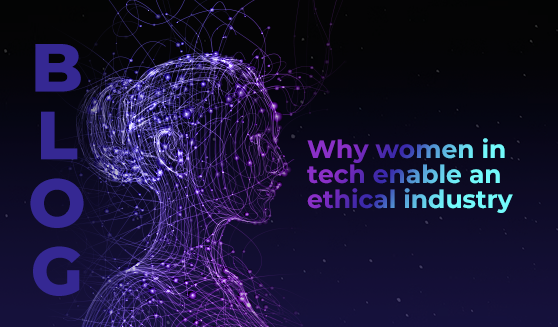
Why sustainability is the heart of the smart city revolution
The smart cities of the future will use tech to lower emissions, cut urban temperatures, and improve quality of life in highly populated areas.


We’re talking about ethics a lot this week. And while we’re thinking about how the tech industry can cultivate ethical decision-making, we thought we’d highlight one very valuable resource: women.
According to the World Economic Forum, the number of women hired for leadership positions in tech rose from 33.3% globally in 2016, to 36.9% in 2022. This is a positive change, but still a small one – and the industry needs to hone in on strategies to close the gender gap.
We’ve written blog posts before about how increased gender diversity in the industry can drive business performance and enable social change. So today we want to focus on ethics – and how women in tech leadership and technical roles can improve the ethics of the industry.
Gender bias within technology itself has become a bigger issue lately, because more people are using AI in their daily lives – and research shows that AI has in-built gender bias.
For example, researchers have identified bias in the way that AI systems interpret language. One report from Boston University described how ‘word embedding’ can amplify existing biases within data. Word embedding is a popular framework in NLP models that allows text data to be represented as vectors – as once embedded, the AI will replicate its gendered interpretation of particular words time and time again.
The researchers found that words including ‘nurse’, ‘homemaker’, ‘hairdresser’, ‘librarian’, and ‘nanny’ were commonly identified as female-gendered words; while ‘doctor’, ‘philosopher’, ‘architect’, and ‘broadcaster’ were embedded as a male-gendered words.
But the effects of gender bias in technology aren’t just theoretical. It’s not about being annoyed for the sake of being annoyed. In practice, inequalities in data can cause serious physical and societal harm to the underrepresented party.
If you look at data collected from car crash dummy tests, for example, with dummies designed using male bodies and make seating positions, we know that women’s body dimensions don’t fit the standard that’s being tested. And as a result, women are 47% more likely to suffer serious injury in a car crash, and 17% more likely to die than a man in an equivalent crash.
Research by Gartner warns that by 2022, 85% of AI projects will “deliver erroneous outcomes due to bias in data, algorithms or the teams responsible for managing them.” In order for AI to have a positive influence on human life and be genuinely useful, we need to combat biases in algorithms – and we have to do it urgently.
And more women in technical roles – actually developing AI, and other technologies – is pivotal to fighting gender bias. Women bring a different perspective to product development, and a gender-balanced team is more likely to design products that are based on diverse data, and useful to more diverse user groups.
A growing body of research suggests that women can help tech businesses make more ethical decisions.
One report published in the journal Organizational Behavior and Human Decision Processes included three studies that examined how men and women might react if they were presented with an opportunity for financial gain – but would only achieve that gain if they did something deceptive.
Across the three studies, women demonstrated a stronger likelihood to behave honestly, to conduct negotiations with transparency, and to maintain their integrity. Women were also less likely to find ways to rationalise unethical choices – while the men in the studies were more likely to create stories that excused their unethical behaviour, by blaming someone else or reducing their own accountability.
Results like these have been replicated time and time again – showing that women are generally less inclined to disassociate their morals from their business decisions.
In the current global landscape, we need ethical leadership. We need leaders who are committed to creating ways for ethics and business to coexist, and even be mutually beneficial. This 2023 survey by Women in Tech found that 90% of respondents believe the tech industry would benefit from a gender-equal workforce, and 61% think gender equality in tech would lead to better decision-making.
So let’s keep working towards a more gender-diverse workforce. We’re committed. Are you?

The smart cities of the future will use tech to lower emissions, cut urban temperatures, and improve quality of life in highly populated areas.

Discover the cities that rank highly for smart city preparedness, and learn why locally relevant innovation is more important than cutting-edge tech.

If you’ve ever thought about becoming a tech investor, read this – learn why investors are the quiet force shaping the future of the industry.

The smart cities of the future will use tech to lower emissions, cut urban temperatures, and improve quality of life in highly populated areas.

Discover the cities that rank highly for smart city preparedness, and learn why locally relevant innovation is more important than cutting-edge tech.

If you’ve ever thought about becoming a tech investor, read this – learn why investors are the quiet force shaping the future of the industry.